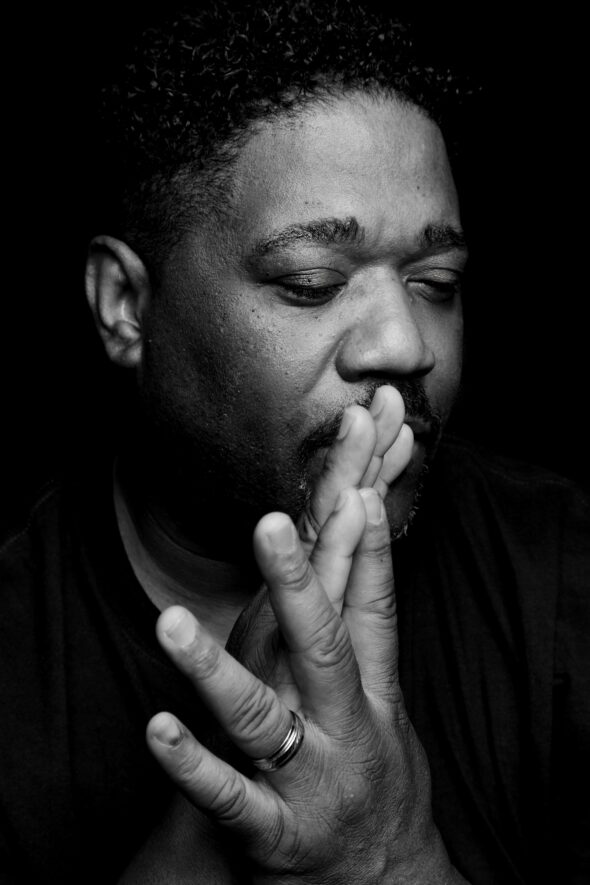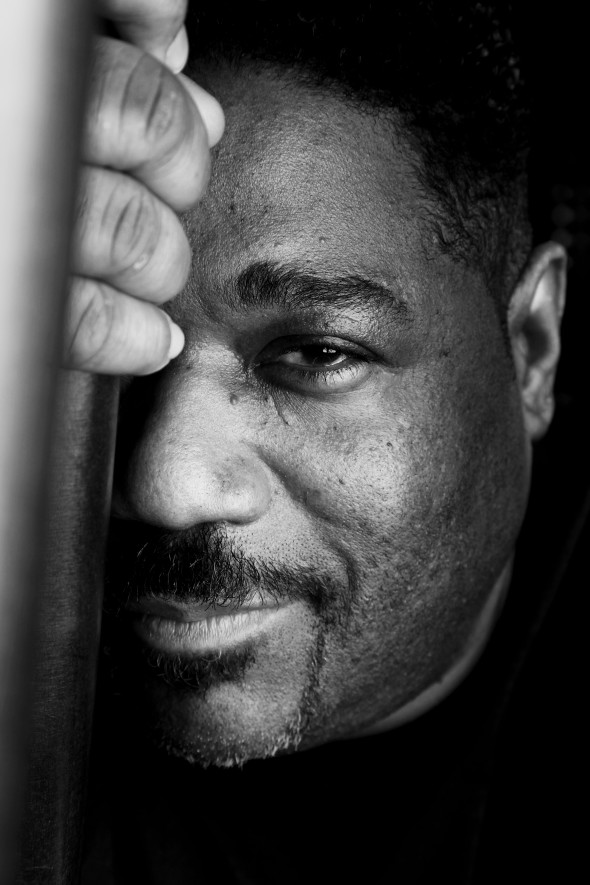Interview by Marc Girardot in Berlin; Wednesday Dec. 09, 2015
After his DJ set at Panorama Bar this past Sunday, the living legend of house music, Chez Damier, accepted to take some time for an interview.
Chez, a pioneer of dance music, has been witness to some of the primordial events that have marked the evolution of electronic culture. His multiple collaborations with renowned artists like the The Bellvilles Three (Juan Atkins, Derrick May, Kevin Saunderson) at the beginning of his career, and his partnership with Ron Trent from Prescription Records (considered one of the greatest labels of house music) prove his weight in the electronic music canon. Originally from Chicago, he lived in Detroit and New York City. He experienced the music scene in France, Germany and the UK during his life, transcribing all these different influences into his music.
In this interview, Chez Damier confirms his status as master in the international electronic scene. He explains the aim of his art, the intention of his approach and shares his opinion about the current state of a culture he has been representing for 23 years. He is without doubt a wise and experienced artist, unparalleled in his field.

Portrait of Chez Damier by Marie Staggat, courtesy of Mn2s Agency.
Marc Girardot: Chez, how do you describe your own sound?
Chez Damier: I come from house music, but my sound is a very mixed breed. I am a combination between my Chicago, my Detroit, my New York and my Europe. That is my make! That is my DNA! Each of those cities I have actually lived, really lived. These four elements have been my foundation for the last 22 years of my life. They have always been a part of the picture. They are my ingredients. They are the things I put into my set as a DJ because this is where I come from.
MG: I heard that you are not completely satisfied with the “official” history of dance music. Do you think that we have minimalized the importance of Europe in this phenomenon?
CD: We cannot simply say “Chicago House is this” without understanding what came before. To know what happened before you have to look at the history. And what came before is electronic from Italy, from the UK, also the German techno has taken a part in it. For me, house and techno are really an evolution of electronic music, not the other way around!
MG: So, Europe has been an important element in your life. But, what is Berlin in particular representing for you?
CD: Germany is a part of who I am. I spent time in Frankfurt and in Munich but Berlin in particular is a part of my fabric. I have been visiting Berlin 23 years of my life, I was here before the wall came down. The way I look at the city is unlike any other DJ who is coming to Berlin today. I was in Berlin before it became fashionable here. You must know what Berlin looked like 20 years ago. Everything was about techno in the city but there were a couple of house things happening. I was in the original techno scene, doing house. It was a really amazing experience. I am thankful about this.
MG: Could you explain what Frankie Knuckles made for you?
CD: My very being… Frankie Knuckles made me Chez. Frankie Knuckles singularly changed my life. He singularly inspired my producing career, he singularly inspired my DJing career. He was the first one who ever called me “legendary”. And I have to admit, for your master to call you “legendary” many years before he left this earth, it was the best gift in the world for me.
MG: Now, the Chicago Cultural Center shows the impressive vinyl collection of Frankie Knuckles. Also, there is the opening of the Dance Hall of Fame in Los Angeles, the Museum of Modern Electronic Music in Frankfurt, the project Living Archives of Elektronika in Berlin. All these elements represent an accomplishment, I guess. You have witnessed the disregard accorded to electronic music. How do you feel about the credit recently granted to it ?
CD: You know what, man? I think that anybody in this electronic world could not be given enough credit for doing what they do. There has to be more museums, more tributes, more monuments or whatever, about the culture. Because it is really about a culture. It is about an evolution’s culture. And it is probably the most fascinating culture known to man by now, because it was truly an entertainment. If I would look at it from afar, I would say: “Wow! Just to see the change, the evolution… It is amazing. More than I could even imagine.”
MG: What do you think about the negative association of dance music and drugs? Do you think it is justifiable?
CD: In the historical perspective of music period, there was always a relationship with drugs. I would say that the problem I find today isn’t about the relationship with each other. But it is really who is using who in it. The question becomes to me: are you using drugs or are drugs using you? And I think we live in a culture right now where drugs are using people. It wasn’t like that in my day. We took drugs as well but it was never about the chase. Today it is about the chase. We danced for ten or twelve hours at the time, there was no chase. We knew exactly what we wanted to come and do, and let the DJ take control. That’s the difference! I can’t say it is bad, I can’t say it is good. But based on what I see it doesn’t look good, nowadays.
MG: Do you think that people on drugs cannot be really receptive to your art? Is their opinion completely objective?
CD: No! Because I believe that the spirit that is in me demands a real experience back. I don’t get followers who are addicts in that capacity. I like the fact that people on that level don’t follow me: that’s why I am not a rockstar. I like the people who are conscious enough to know what they want. When they come to me, it is an exchange. I’m giving you, you’re giving me and it is a give and take!
MG: How do you describe your job as a DJ?
CD: I am not a DJ, I am an entertainer! I produce a feeling in the room. I am a designer. My job is to design a moment in this room for one, two, or three hours while I am playing. I have to design the room for myself musically, mentally, spiritually. That’s the exchange! Once I have designed it, I am able to produce the results, and producing the results is people having a good time, in the end.
MG: How do you feel when you compare your approach with the approach of other DJs?
CD: I think they are doing it because they want to be a DJ. I don’t want to be a DJ, I want to be a designer. I want to produce a moment. I want to give people memories. Everyone has a different perspective on looking at things. I just choose to not look at it that way because for me it is a fashion. Chez Damier has never been in fashion! So you must know that if I have never been in fashion, I will never go out of fashion.
MG: You have begun a studio partnership with the Parisian Ben Vedren. What is the aim of your collaborations with young artists?
CD: I always liked to collaborate with young artists. I like to invest. I think it is smart to invest. Some people invest in property, some people invest in banking. Me, I invest in people! My best work is to inspire undiscovered artists. It just makes sense for me to inspire undiscovered artists. I like the idea that I could inspire one person who could probably be able to inspire one thousand other people. Ben is a very good friend of mine. Actually, we are working on an album project. I am really excited about it. In fact, I put my own personal project on hold for this album.
MG: Could you tell us more about this album? Are you looking for musical innovations?
CD: We are just going to be ourselves. With Ben and me, the innovation is our energy. We are discovering an energy for producing which is like fire for us. So, with our project Heart 2 Heart we want to introduce this energy for 2016. It will be a really interesting expression about production between us.
MG: So, you are working on another project besides the album Heart 2 Heart.
CD: Yes, I am writing a book which talks about the history of dance music and the evolution of the culture it refers to. I want to publish it for 2016 also.
MG: As a witness to the evolution of dance music, do you have any idea of what the music of tomorrow is going to sound like?
CD: Like I could see the future! [laughs] To be quite honest with you, I do not know. But I do know this much: the music we have already experienced will never die! It doesn’t make a difference what music will look like in the future. We are able to produce something that lives longer than us. That’s amazing! People die, music doesn’t!

Portrait of Chez Damier by Marie Staggat, courtesy of Mn2s Agency.
Today, Chez Damier has nothing to prove anymore. Respected by all, it seems that Chez has started a transmission process in his life. To talk about what he has already done is pointless in his opinion: “I’m not living on the man I used to be, I’m living now!”.
Based on the quality of their 2014 release Say the Word and the project Heart 2 Heart with the released track Shigan, we just can’t wait to listen to the collaborative album between Chez Damier and Ben Vedren.
During this interview, I have noticed that, above all, Chez Damier wishes to share his experiences with the new generation. Obviously, that is the aim of his own personal project and if we can judge by his ease with words, I am sure that Chez Damier’s book will quickly become a must-read.

























